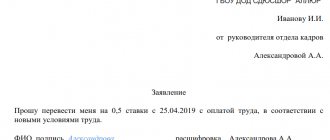Home / Labor Law / Employment / Hiring
Back
Published: 05/09/2017
Reading time: 9 min
0
3726
In a highly competitive employment environment, employers are using increasingly stringent measures to screen potential employees. One of the selection methods that is increasingly common among most companies is internship.
The purpose of its implementation can be different - testing the employee’s knowledge, training him in practice, selecting the best candidate. However, it is important that this procedure is formalized in accordance with the law. Therefore, more details about the registration procedure, required documents and payment features are given later in the article.
- Legislative regulation and the need to carry out
- Admission conditions
- Duration
- Registration procedure
- Payment Features
- Making a decision based on the results of the internship
- What do you need to remember about driver training?
Dear readers! To solve your problem, call hotline 8 or ask a question on the website. It's free.
Ask a Question
Legislative regulation and the need to carry out
The legislation does not provide for separate provisions specifically dedicated to internships.
In Art. 59 of the Labor Code of the Russian Federation only provides for the possibility of concluding a fixed-term employment contract if an employee is hired for a short period of time (less than two months). Also, an internship can be considered work during a probationary period, based on the results of which a decision is made to employ the candidate or to refuse him. The probationary period is regulated by Art. 70 Labor Code of the Russian Federation.
Therefore, at enterprises that practice such tests when hiring, there must be a separate document regulating the conditions for their conduct. For example, this could be “Internship Regulations”.
Also, conditions regarding this may be contained in the Collective Agreement and issued by a separate order.
The terms of the trial must be included in the employment contract with a specific employee.
Typically, an internship is carried out in the following cases:
- In relation to young specialists who have just graduated from an educational institution and do not have practical work experience. In this case, the internship will be a type of educational process, but more specific and aimed at a specific type of activity.
- With a lot of competition for the position. This option is practiced by many large and prestigious companies when they have a vacancy. In this case, several candidates are accepted for an internship; after completion, only the one who showed the best results gets the job.
- For employees who change their type of activity. Such candidates may have practical work experience, but only in a different field. The test is carried out to give them practical skills in a new job.
- According to the terms of the concluded student agreement. This includes situations where interns are trainees from educational institutions. After completing the internship, they can either leave the place of work or get some kind of position there.
In some cases, internships are also used for not entirely legal purposes, accepting candidates for temporary free or cheaper work.
To avoid getting into such a situation, the applicant should take care of the correct documentation of the procedure.
Employment contract for a probationary period without pay
As a rule, internships are offered to yesterday's students who have received the necessary amount of theoretical knowledge, but do not yet have practical work experience.
When an intern is hired, it is necessary not only to bring him up to date, but also to correctly draw up all documents related to employment, including the internship agreement. This is what personnel department employees usually call an employment contract concluded with interns, although the essence of the document does not change with a change of name. What is an employee internship agreement 2016? Since the legislator interprets internship as a production activity, it should be formalized in accordance with the norms of the Labor Code. Therefore, the internship agreement is drawn up in the form of a fixed-term or open-ended employment contract.
https://youtu.be/IX8YdZMntuw
By concluding a fixed-term employment contract with an intern, the employer does not violate the law, since the performance of work directly related to professional training and internship is considered a sufficient basis for such a decision (Article 59 of the Labor Code of the Russian Federation). The period of validity of the document is established taking into account the specific terms specified in the internship plan, and when the trainee’s training program comes to an end, the employer has the right to terminate the employment relationship with him on the basis provided for in paragraph 2 of Art.
A young specialist who wishes to undergo an internship at an enterprise (organization) can be entered into either a fixed-term or an indefinite employment contract.
To conclude a fixed-term contract there must be the grounds provided for in Art. 59 Labor Code of the Russian Federation. In particular, the grounds for concluding a fixed-term contract with an intern may be:
- performance of temporary work by an intern;
- the trainee performs work that is not included in the employer’s list of activities;
- the trainee’s performance of work related to forms of industrial practice.
The validity period of the employment contract, if it is urgent, must correspond to the period of implementation of the activities established by the order and plan for the internship.
A fixed-term contract can be concluded for a period of no more than five years.
A fixed-term employment contract with an intern terminates along with the duration of the internship.
If the trainee and the employer come to an agreement to continue the employment relationship, then an additional agreement will be attached to the fixed-term employment contract, by virtue of which the fixed-term employment contract will be considered indefinite, that is, concluded for an indefinite period.
Accordingly, changes must be made to all personnel documents of the trainee. In particular, the position is being replaced.
If the intern and the employer decide to terminate the employment relationship after the end of the internship, then the fixed-term employment contract will be terminated by virtue of Art. 77 of the Labor Code of the Russian Federation with making a corresponding entry in the work book.
We invite you to familiarize yourself with the procedure for identifying the culprit of an accident.
Legal Yandex Zen! There are our special legal materials in a convenient and beautiful format. Subscribe now.
The internship agreement presupposes the hiring of aspiring young professionals.
At the same time, at the time of execution of such an agreement, the employer is not sure that he will hire such an employee in the future. Everything will depend on how well the trainee performs.
At the same time, the labor relationship between the employer and the novice specialist must be properly formalized.
An internship for a young specialist in a company means familiarizing him with the current work process, personnel, and job functions. The theoretical knowledge he previously acquired is consolidated in practice, and the specified specialist performs the work tasks he needs and is directly involved in the work process.
This article talks about typical ways to resolve the issue, but each case is unique. If you want to find out how to solve your particular problem, call:
- Moscow.
- Saint Petersburg.
Or on the website. It's fast and free!
When hiring an intern, like any other employee, the employer signs an employment contract with him. Other personnel documents are also issued for the trainee: application, dismissal order, personal card, etc. These are mandatory requirements that do not depend on the industry in which the employing company operates.
The status of an intern should not confuse the employer: not a separate internship agreement is drawn up with him, but a standard employment contract.
The procedure for conducting internships for young specialists should be enshrined in the company’s local regulations.
In particular, the employer must clearly state the terms of the internship, the amount of remuneration, the supervisor of the interns, the activities planned for implementation, as well as other conditions.
An employment contract with an intern can be concluded in two variations: as a fixed-term or as an indefinite one. In most cases, it is issued for an indefinite period (it is unlimited).
In order to conclude a fixed-term employment contract, an employee must have grounds under Art. 59 of the Labor Code.
It must include the performance of work that is associated with professional training, practice or additional education in the form of an internship.
When concluding a fixed-term contract with an intern, it must be concluded for a clearly limited period. Restrictions are related to the period of practice or training. The start or end date of work must be indicated in the event program. A fixed-term employment contract is signed for a period of 5 years.
When setting the amount of payment in favor of the trainee, the employer should take into account the provisions of Art. 204 TC “Apprenticeship payment”. It says here that the amount of payment in favor of the employee should not be less than the federal minimum wage and depends on the qualifications of the intern.
The employment contract with the intern must be concluded in writing. The contract specifies:
- details of the parties;
- their rights and responsibilities;
- start and end dates of the internship;
- features and procedure for settlements with the intern (date of transfer of salary, scholarships, etc. and their amount);
- conditions for fulfilling duties;
- place of work;
- responsibility of the parties, etc.
We invite you to familiarize yourself with the Horsepower Fee
The agreement is drawn up in two copies, one for each party. On the employer's contract, the trainee puts a mark indicating that he has received his version. On behalf of the employer, the contract is signed by the manager, who acts on the basis of the charter, or by another person on the basis of a power of attorney.
Signing an employment contract allows a specialist to officially become part of the staff, receive a salary and other payments.
After signing an agreement with an employee, the employer issues an order. The contents of the order and the Internship Regulations (it must contain a list of the intern’s job responsibilities), approved by the company, must be familiarized to the employee against signature.
Usually, based on the results of an internship, an employee is given recommendations on his professional suitability, which can increase his chances of further employment.
The employment contract upon expiration of the internship period will be considered completed on the basis of clause 2 of Art. 77 TK. But this is required if the results of the internship were unsatisfactory and the employer is not interested in continuing cooperation with the intern.
If the internship is received positively by the management, then it has the right to sign an additional agreement to the fixed-term contract recognizing it as indefinite. At the same time, the position of the intern is changed in personnel documents.
Evgeniy Malyar # Business documentation
The article provides sample documents available for download. The main legislative provisions and nuances are also given.
- How to draw up an employee internship agreement
- What should a trainee be prepared for?
- Internship order
- Unpaid internship agreement
- Internship contract at an individual entrepreneur
Increasingly, permanent employment is preceded by an internship. This practice is common due to a number of advantages over the introduction of a probationary period.
Often, the future employer looks for an intern among senior students at higher and secondary specialized educational institutions. An important aspect in this situation is the legal side of the matter.
The topic of the article is the correct execution of an agreement with an intern.
An internship is a limited time period of consolidating theoretical knowledge through its practical application in the process of work.
An intern can be a full-time employee (before moving to a new position), a newly hired employee or an apprentice. Concluding an employment contract with him is mandatory.
Some enterprises specializing in public services make internships a mandatory condition of employment. For example, a hairdresser in a beauty salon will not be hired for a permanent job without it.
By its nature, an employment contract for an employee’s internship is always fixed-term, since the date of its termination is known - it is established by the head of the enterprise (Article 59 of the Labor Code of the Russian Federation). There is a standard template for this document in several versions.
We suggest you read at what stage of pregnancy do you go on maternity leave?
Admission conditions
Subject to official acceptance for an internship (that is, with the conclusion of an employment contract), the intern is subject to all the same rights as other employees. This means that he has the right to receive wages for hours actually worked, breaks at work, days off, etc. The employer is also obliged to pay all taxes and contributions for him.
As for job responsibilities, they are specified in more detail in the employment contract. Most often, the intern is not assigned any serious tasks, and he only helps the company specialists with whom he is training.
Many enterprises (especially state-owned ones), when hiring an employee for an internship, assign him a supervisor from among the permanent employees, who will be responsible for his training. A work plan and a list of issues that he must study during the test are also drawn up for the trainee.
After completing the internship, the employee must write a report indicating what exactly he learned during this period.
Also, the supervisor must evaluate the success of his training and work, documenting this in a special document (most often it is called a review of the intern or a conclusion based on the results of the internship).
Internship agreement – open-ended or fixed-term
In what form is it better to conclude an agreement with a trainee specialist? The status of a practicing worker should not be confusing: in essence, this is the same employee as everyone else. Therefore, an employment contract (EA) can be regular (indefinite) or limited in time (fixed-term). In most cases, the contract is drawn up without specifying a validity period. To conclude an urgent TD, it is necessary to have a basis under Art. 59 TK:
- Carrying out work directly related to vocational training, practice or additional education in the form of a professional internship.
Duration
The legislation does not establish the exact duration of the internship; it only limits its maximum permissible duration. Depending on how the employee was registered, this period may be:
- 2 months - if a fixed-term employment contract was concluded;
- 3 months - if the employee was hired on a probationary period.
The specific duration must be specified in the employment contract. Otherwise, it will be considered that the period is set at the maximum amount. After its end, the employer must either continue the relationship with the employee and conclude a new contract with him, or refuse him further employment.
In this case, both parties have the right to terminate the relationship before the end of the established period. The only condition for this is to notify the other party of the termination of work at least three days in advance (by writing a statement or issuing a corresponding order).
The employee has the unconditional right to terminate the relationship early, and he is not obliged to explain the motives and reasons for his action.
But the employer must document the intern’s inadequacy for the future position: memos, acts, etc.
How and why to use it
This agreement provides for the regulation of the trainee's work process. It is necessary to indicate the purpose of the document and the main aspects of the employee’s employment. Usually this is the consolidation of theoretical skills that are necessary for conducting activities. The duration of the internship is specified. The main points are indicated in Article 59 of the Labor Code of the Russian Federation. Before registration, it is recommended to familiarize yourself with the legislative act. You can also find a sample filling.
https://youtu.be/fjwZYArN2iE
Was our site useful? Share the page with your friends on social networks
Registration procedure
If the company does not have special documents regulating the procedure for conducting an internship, the employer, first of all, needs to start preparing them. After this, the registration procedure will look like this:
- Receiving a corresponding application from the candidate. It is drawn up in free form, similar to a job application. Only the main part of the document indicates a request for acceptance into an internship.
- Conclusion of a fixed-term employment contract. Occurs on the basis of the submitted application. The document defines the specific conditions of future activities: duration, payment, responsibilities.
- Issuance of an order. It confirms the fact that an employee has been accepted for an internship, indicates his supervisor (or supervisor), the probationary period and the payment procedure. The temporary employee is familiarized with the completed order and signed.
- Development of an internship plan (program). It displays the main issues that the employee must study, as well as the goals and objectives that he needs to achieve. The enterprise can either develop a template for this document, or the manager can draw it up for each individual case.
After this, the employee is considered accepted for the internship and begins his duties under the terms of the contract.
After the end of the period, based on the trainee’s report and feedback from the supervisor, the manager makes a decision on his further employment.
What are internships for?
Hiring an intern for a job often causes difficulties in registration for employers
An internship is needed so that a young specialist can practically confirm his knowledge, improve his qualifications, and learn from the experience of senior colleagues. Employers are also interested in hiring young professionals. This is fresh blood for the enterprise; a young team is more preferable, as this is the development and growth of the company. However, this is not about that now.
A young employee who joins a new team as an intern must try hard to be noticed among the rest of the employees. The employee must show all his best sides, abilities, and skills. As a rule, a trainee is assigned a mentor - a more experienced specialist who will introduce him to the team, introduce him to management, introduce him to corporate ethics, and help in his work. For most of his time, the intern will have to learn the basics of adult working life on his own, but these attempts are not always brilliant.
How to apply for an internship?
Hiring an intern often causes difficulties in registration for employers, and all because there is insufficient knowledge of the law. It is important that any relationship between employers and employees is documented.
According to the Labor Code, an internship is the same activity as any other; it must be formalized in accordance with the law. Those who refuse to take on an officially registered trainee face administrative fines (Article 5.27 of the Code of Administrative Offenses of the Russian Federation). Among other things, students are also required to comply with labor safety rules, internal discipline rules, and other standards existing at the enterprise. Trainees signed under an employment contract, along with other employees, are subject to social insurance.
Before an intern is hired, he must go through standard admission procedures - from interview to registration.
Since we learned that an internship is the same kind of work activity, an agreement must be concluded. The contract must be fixed-term, i.e. indicating the time frame of the contract, which corresponds to the internship period, or student. After signing an employment contract, the trainee is considered a full-time employee with an appropriate salary.
Accordingly, after the conclusion of the contract, an order is issued to hire the trainee. The registration of an intern for work ends with an entry in the work book and entering data about the employee into his personal file. The entry in the book looks like “hired as an intern.” If a candidate is accepted under an apprenticeship contract, then no entry is made in the work book, according to the Labor Code. The internship is included in the overall work experience.
Payment Features
When formalizing an internship, payment for this period is a mandatory condition for the employer. The amount of wages is determined between the parties on a voluntary basis .
Obviously, the amount of payment for an intern will be significantly lower than for other employees of the company, because his professional level is in doubt.
But at the same time, the employer is prohibited from charging a salary less than the minimum amount established by law.
However, there are often situations where the internship is carried out unofficially - the employee is simply asked to go to work for a certain period and study. If employment is denied after the test, he will not receive payment for this period. And even if you are hired, they are also unlikely to pay you money for the internship.
At the same time, the applicant will not be able to appeal the employer’s actions and force him to pay, because he does not have any documentary evidence of the employment relationship. Often, employers themselves warn potential employees that the internship will be free. Therefore, he himself must assess all possible risks in advance.
Compensation upon dismissal
In order to reduce the risks of wasted costs, companies enter into contracts with interns that provide for the payment of compensation for dismissal before the end of their service. In this case, compensation will be calculated based on the time not worked after completion of training (249 Labor Code of the Russian Federation). However, an employee cannot be required to reimburse funds spent on studies under any circumstances. Even if such a condition is provided for in the contract, it is prohibited to apply it. The only thing that can be reimbursed by the employee is the time that the employee did not work in accordance with the contract.
Making a decision based on the results of the internship
The final decision on the further employment of an employee can be made in the following ways:
- Based on the curator's review. As already noted, this document is drawn up in almost all cases and contains the conclusions of the trainee’s immediate supervisor about him. The supervisor can most accurately indicate how successfully the employee coped with his responsibilities and what tasks he was unable to complete.
- Based on the exam results. Its implementation allows you to determine how well the employee has mastered the training. The exam can take place in different forms: orally, in writing, with practical tasks. The specific method of carrying it out is determined on an individual basis.
- Based on the employer's personal assessment. During the internship, the employer often has the opportunity to independently observe the intern: his training, success at work and behavior in the team. Based on this, he decides whether to leave him in the company or not.
In the event that for some reason the employee is not suitable and the employment relationship with him will not be continued, it is advisable that the employer has documentary grounds for such a decision. For example, negative feedback from a supervisor, poor exam results, etc.
Otherwise, the trainee will be able to challenge the refusal of further employment in court.
How to get maternity leave if you don’t work - full information in our article! All the information you need on calculating sick leave is on our resource. The targeted article written by our professionals contains all the information on this topic. How to resolve the issue of sick leave pay after your dismissal - read here.
Internship in Education Law
This concept is mentioned in the Federal Law on education, dated December 29, 2012 No. 273, and in the form of two different terms:
- assistantship-internship;
- actual internship.
Regarding the first of them, Article 12 is decisive, which establishes the concept and types of educational programs. Assistantship-internship is included in their list along with adjunct, bachelor's, residency, master's and others.
Wherein:
- Article 33 of Federal Law No. 273 calls assistant trainees trainees;
- the requirements of Article 60 oblige the organizer of training events to monitor the level of knowledge acquired by assistants and, based on the results, issue them a diploma on completion of the assistantship-internship;
- Article 69 indicates that only those who have a higher education are allowed to study the said program.
The second concept appears in the law only once (Clause 12, Article 76), and incidentally. It is said that an additional professional training program can be implemented in the form of an internship. From the perspective of the aforementioned Federal Law:
- “additional” in relation to education means that it is not associated with an increase in qualification level;
- “professional” about the program implies a focus on advanced training or professional retraining.
This understanding of internship is, of course, closer to the activity that employers conduct at their discretion. However, there is a serious snag: clause 3 of Article 23 established the types of institutions entitled to implement such programs, and all of them are educational. From the perspective of the Federal Law, a manufacturing enterprise or trading company can be the base of an internship, but not its organizer.
Law No. 273 does not specify whether the internship must be paid. There are no other regulations on this issue. The previously in force Federal Law No. 125 dated 08/22/1996 on postgraduate education and the Regulations on advanced training of specialists dated 06/26/1995 No. 616 have lost force. The letter of clarification from the State Committee for Higher Education dated March 15, 1996 regarding the organization and implementation of internships for specialists No. 18-34-44, although not canceled, is outdated. Moreover, it was never a normative act.
Payment according to the legislation of the Russian Federation
Payment will depend on the skills that you acquire during the course of study, that is, when you sign a contract, and if all standards are met, you will receive a set and pre-discussed amount.
There are several aspects that are noticeable in practice. There is an apprenticeship agreement or a student agreement. All funds that should be accrued will be paid in the form of a scholarship in the amount specified by the educational institution.
Fixed-term contract. If the training is formalized in an individual agreement between management and the candidate, in this case the amount of payments is decided by this document. The amount of payment must be no lower than the minimum wage, generally approximately half or seventy percent of the salary of a full-time employee.
The main rule is that all of the above types of work must be formalized in a written agreement; without such a document, you can easily be deceived; using such a document, you are sure that you will be paid a salary in the amount specified in the contract. Contracts drawn up in words most often are deception and free labor, because according to the law you will not be able to present anything and prove that you are right.
https://www.youtube.com/watch?v=W6Uk0pHLPgk









